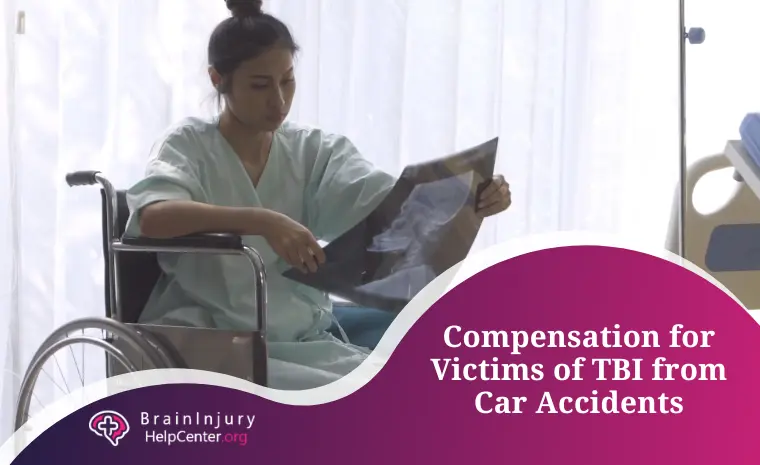Compensation for Victims of TBI from Car Accidents
A traumatic brain injury (TBI) is a complex injury to the brain that can result from a sudden, violent blow or jolt to the head or body. When a traumatic brain injury is caused by an accident due to someone else’s negligence, you may have the legal right to seek compensation for your injuries and related expenses.
Victims of a car accident who sustain a TBI may be eligible to recover compensation for their medical expenses, loss of income, pain and suffering, and more.
In this article, we will discuss:
- Traumatic brain injury: signs and symptoms
- Recover compensation for your tbi
- How to recover maximum compensation
Sustained a TBI from a car accident?
TBI Car Accident Signs and Symptoms
The Mayo Clinic describes a traumatic brain injury (TBI) as an injury that results from a violent blow or jolt to the head or body, this is also known as a closed brain injury. A TBI may also occur due to an object piercing through brain tissue, such as a bullet or a shattered piece of skull, this type of head injury is known as penetrating brain injury.
TBIs can vary in severity from mild to severe and can lead to a range of physical, cognitive, emotional, and behavioral impairments. They are often categorized based on their severity:
1. Mild brain injury – Mild TBIs, commonly referred to as concussions, involve a brief loss of consciousness or confusion. Mild brain injury symptoms may include headache, dizziness, nausea, blurred vision, memory problems, and sensitivity to light and noise.
2. Moderate to severe brain injury – These injuries involve more significant damage to the brain and may lead to prolonged loss of consciousness, memory loss, changes in behavior, and other severe cognitive and physical impairments.
In a motor vehicle accident, a traumatic brain injury can occur due to various causes, including:
- Direct impact to the head – A collision can result in a direct blow to the head, such as hitting the steering wheel, dashboard, windshield, or side window.
- Whiplash effect – The rapid back-and-forth movement of the head during a motor vehicle collision can cause the brain to strike the inside of the skull, leading to a head injury.
- Deceleration/Acceleration – When a vehicle comes to a sudden stop or accelerates rapidly, the brain may continue to move inside the skull, leading to injury.
- Objects within the vehicle – Unsecured objects or debris within the car can become projectiles during a motor vehicle crash and impact the head.

Signs and Symptoms of a TBI
Signs and symptoms of a traumatic brain injury can vary depending on the severity of the injury. Some of the common signs and symptoms include:
- Headaches
- Nausea or vomiting
- Light and noise sensitivity
- Fatigue or drowsiness
- Loss of balance or coordination
- Temporary memory loss
- Slurred speech
- Mood swings
- Anxiety or depression
- Changes in sleep patterns
- Seizures or convulsions
It’s important to note that symptoms may not appear immediately after an accident and could develop over time. Symptoms may not show themselves right away for many reasons such as the complex nature of brain injuries and the body’s response to trauma. If you suspect you or a loved one sustained a brain injury in a car accident it is critical to seek medical attention as soon as possible.
Diagnosing and treating a TBI early can significantly improve the chances of recovery and minimize long-term effects. If you experience any of the symptoms mentioned above following a car accident, it’s essential to consult a medical professional.
Sustained a TBI in a car accident?
How are TBI Damages Calculated in a Personal Injury Claim?
Calculating traumatic brain injury (TBI) damages in a brain injury claim is a complex process that involves assessing various factors to determine the compensation that may be owed to the injured party. Damages in a TBI claim typically fall into two main categories: economic damages and non-economic damages.
Economic Damages
Economic damages are tangible, quantifiable financial losses incurred due to the TBI. These damages are generally easier to calculate because they involve actual monetary expenses. Economic damages in a brain injury claim may include:
- Medical expenses – This includes past and future medical bills related to hospitalization, surgeries, healthcare provider visits, prescription medications, medical equipment, rehabilitation, physical therapy, occupational therapy, and more.
- Lost income – If the TBI caused the injured person to miss work or if it affects their ability to earn a living in the future, the damages can cover both past and future lost income or earning potential.
- Property damage – If personal property was damaged in the accident, such as a vehicle, those repair or replacement costs can be included.
- Other financial losses – This can encompass any other out-of-pocket expenses directly related to the TBI, such as transportation costs for medical appointments, home modifications, and more.
Non-Economic Damages
Non-economic damages are more subjective and relate to the emotional and psychological impact of the TBI. These damages are not as straightforward to calculate because they involve intangible losses. Non-economic damages in a TBI claim may include:
- Pain and suffering – Compensation for physical pain, emotional distress, and overall suffering caused by the TBI and its effects.
- Mental anguish – Compensation for psychological distress, anxiety, depression, and other emotional challenges resulting from the TBI.
- Loss of enjoyment of life – Compensation for the reduction in the injured person’s ability to engage in activities they once enjoyed due to brain damage.
- Loss of consortium – If the TBI has negatively impacted the injured person’s relationships with their spouse or family members, this can lead to compensation for loss of companionship, support, and affection.
It is important to work with an experienced brain injury lawyer who can properly assess the various factors involved in TBI car accidents. An accident lawyer can help gather evidence, consult medical experts, and apply legal expertise to determine an appropriate compensation amount that accounts for both economic and non-economic damages resulting from the traumatic brain injury.
How to Recover Maximum Compensation
Recovering maximum compensation for a road accident caused by a negligent party involves careful preparation, legal expertise, and strategic action. Here are steps you can take to increase your chances of obtaining fair compensation:
1. Seek immediate medical attention – Your health is the top priority. Get medical treatment as soon as possible, even if you think your injuries are minor. Proper documentation of motor vehicle-related brain injuries is essential for your case. It is crucial for victims of TBI car accidents to receive the right medical care and treatment. Victims must undergo testing to ensure their injuries are properly addressed.
2. Preserve evidence – Gather and preserve evidence from the accident scene. This can include photos of the accident, vehicle damage, road conditions, traffic signals, weather conditions, and any visible injuries.
3. Obtain witness statements – Collect contact information from witnesses at the scene. Their statements can support your version of events and help establish the negligence of the other party.
4. Contact law enforcement – Report the accident to the police and ensure a police report is filed. This report can provide valuable documentation of the incident.
5. Consult with an experienced brain injury attorney – Hire an experienced personal injury attorney with expertise in brain injury cases. Brain injury cases are complex, an attorney can guide you through the legal process of your claim and make you aware of all the legal options available to you. An experienced attorney will also file your case within the statute of limitations, ensuring that you have a chance to receive the maximum compensation possible for your case.
6. Establish negligence – Your personal injury lawyer will work to establish that the other party was negligent, which involves demonstrating a duty of care, breach of that duty, and causation of your injuries.
7. Collect medical records and bills – Gather all medical and clinical records, as well as any bills related to your brain injury. This documentation is critical for calculating your damages.
8. Calculate damages – Identify the full extent of your damages, including medical expenses, lost wages, pain and suffering, emotional distress, and future rehabilitation needs.
9. Consult medical experts – Brain injuries often require specialized medical assessment. Your attorney may collaborate with medical experts to accurately assess your condition and future medical needs.
10. Negotiate with insurance companies – Your traumatic brain injury lawyer will negotiate with the negligent party’s insurance company for a fair settlement. This may involve presenting evidence, engaging in negotiations, and advocating for your rights.
Working with an experienced brain injury attorney is crucial for navigating the complexities of your case, ensuring your rights are protected, and maximizing your chances of recovering maximum compensation for your injuries and losses.
Suffered a TBI From a Car Accident? We Can Help!
If you or a loved one has suffered a TBI car accident, support is within reach. Contact the Brain Injury Help Center today! Our team is here to assist you get the necessary medical care and compensation you need and deserve.
If you decide to take legal action and file a claim against the party responsible for your brain injury, we can connect you with a highly skilled group of personal injury attorneys, medical experts, and case managers in California.
Contact us today at (866) 576-0936 and find out how we can help you. We are available 24/7!









